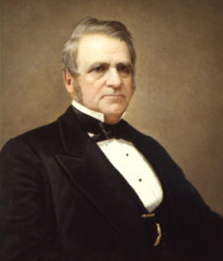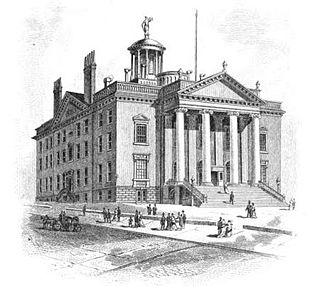External links
| New York State Senate | ||
|---|---|---|
| Preceded by Isaiah Blood | New York State Senate 15th District 1862 | Succeeded by William Clark |
John Willard (May 20, 1792 Guilford, New Haven County, Connecticut - August 31, 1862 Saratoga Springs, Saratoga County, New York) was an American lawyer and politician from New York.
He graduated from Middlebury College in 1813. He studied law, was admitted to the bar in 1817, and commenced practice in Salem, Washington County, New York. In 1829, he married Elizabeth Smith (1794–1859). They were the parents of a daughter, Sarah Elizabeth (Willard) Fowler (1830–1852).
Willard was First Judge of the Washington County Court from 1826 to 1835; Surrogate of Washington County from 1832 to 1837; Judge of the Fourth Circuit Court from 1836 to 1847; a justice of the New York Supreme Court (4th D.) from 1847 to 1853; and ex officio an associate judge of the New York Court of Appeals in 1853.
At the New York state election, 1855, he ran on the Hard Democratic ticket for a seat on the Court of Appeals, but was defeated by George F. Comstock, the Know Nothing candidate.
Willard was Permanent Chairman of the Douglas Democratic state convention of 1860; and a member of the New York State Senate (15th D.) in 1862.
He died at his home in Saratoga Springs, and was buried in Greenridge Cemetery in Saratoga Springs.
Willard's uncle, also named John Willard, was the husband of Emma Willard and served as U.S. Marshal for Vermont.
| New York State Senate | ||
|---|---|---|
| Preceded by Isaiah Blood | New York State Senate 15th District 1862 | Succeeded by William Clark |

Washington Hunt was an American lawyer and politician.

Greene Carrier Bronson was an American lawyer and politician from New York.

Sanford Elias Church was an American lawyer and Democratic politician. He served as Lieutenant Governor of the state of New York and chief judge of the New York Court of Appeals for a decade.

Augustus Cincinnatus Hand was an American lawyer and politician from New York.

Charles Herman Ruggles was an American lawyer and politician who was a U.S. Representative from New York and Chief Judge of the New York Court of Appeals.
Samuel Young was an American lawyer and politician.

The 1876 New York state election was held on November 7, 1876, to elect the governor, the lieutenant governor, a judge of the New York Court of Appeals, a Canal Commissioner and an Inspector of State Prisons, as well as all members of the New York State Assembly and two members of the New York State Senate. Besides, two constitutional amendments were proposed - to abolish the elected Canal Commissioners and appoint a Superintendent of Public Works instead; and to abolish the elected New York State Prison Inspectors and appoint a Superintendent of State Prisons instead - and both were accepted by the electorate.

Gardner Stow was an American lawyer and politician who served as New York State Attorney General.

John Calvin Wright was an American lawyer and politician.

William Fitch Allen was an American lawyer and politician.
Benjamin Welch Jr. was an American politician.

Hiram Denio was an American lawyer and politician from New York. He was Chief Judge of the New York Court of Appeals from 1856 to 1857; and from 1862 to 1865.
Samuel Lee Selden was an American lawyer and politician from New York. He was Chief Judge of the New York Court of Appeals in 1862.
William B. Wright was an American lawyer and politician from New York. He was Chief Judge of the New York Court of Appeals in 1868.
William I. Skinner was an American politician from New York.

Darius Adams Ogden was an American lawyer and politician from New York.

Charles Mason was an American lawyer and politician from New York.

Ezra Graves was an American lawyer and politician from New York.
Francis Seger was an American lawyer and politician from New York.

The 70th New York State Legislature, consisting of the New York State Senate and the New York State Assembly, met from January 5 to December 15, 1847, during the first year of John Young's governorship, in Albany.